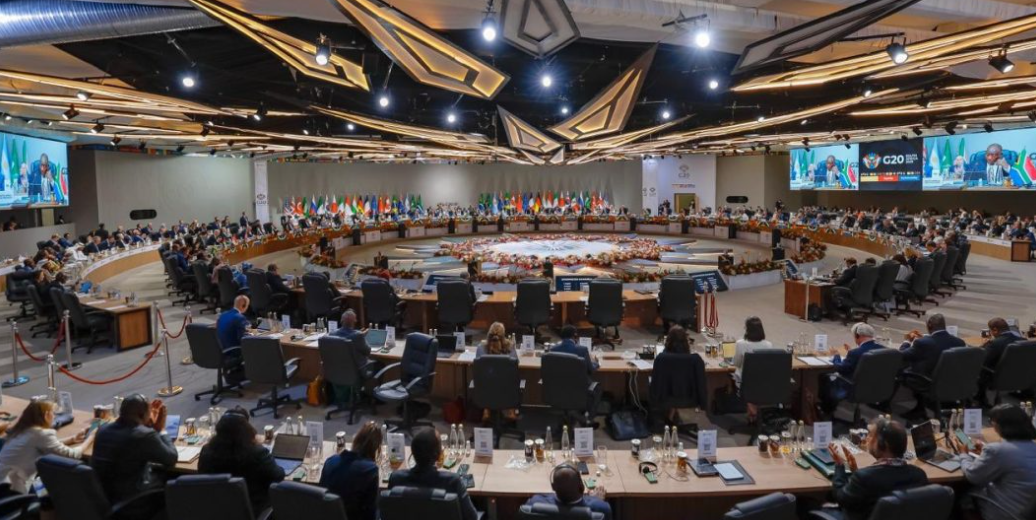By Thapelo Molefe
World leaders adopted a 30-page G20 Leaders’ Declaration in Johannesburg on Saturday, marking the first time the summit has been hosted on African soil and placing the continent’s development priorities at the centre of global governance.
Meeting under the theme “Solidarity, Equality, Sustainability,” leaders emphasised that their gathering was guided by the principles of Ubuntu, saying the summit recognised that “individual nations cannot thrive in isolation” and that global cooperation must ensure “no one is left behind”.
In the document, leaders warned of “rising geopolitical and geo-economic competition and instability” and “heightened conflicts and wars”.
The leaders also condemned attacks on civilians and infrastructure, saying countries must act in accordance with international law and refrain from the use of force against another state’s sovereignty.
On global peace efforts, the declaration committed members to supporting “a just, comprehensive and lasting peace” in Sudan, the Democratic Republic of Congo, the Occupied Palestinian Territory, Ukraine and other conflict zones.
The leaders placed the African continent firmly at the centre of the 2025 agenda.
The declaration reaffirmed strong support for Africa’s development, saying the bloc was committed to advancing “economic growth, trade, jobs and prosperity” on the continent.
The declaration also said that Africa’s representation must grow across global institutions.
The summit endorsed the second phase of the Compact with Africa and launched the G20 Finance Track Africa Engagement Framework, which South Africa described as a long-term mechanism to align global finance priorities with African development needs.
Debt vulnerabilities dominated the economic portion of the declaration. Leaders warned that many low-income countries faced high financing costs and rising debt burdens that were constraining development.
They acknowledged that interest payments for low-income countries had “more than doubled over the past decade,” and committed to ensuring that debt treatments under the G20 Common Framework are implemented in a predictable, timely, orderly and coordinated manner.
The declaration reaffirmed support for a quota-based and well-resourced IMF and welcomed progress in voluntary Special Drawing Rights reallocations, which have now surpassed US $100 billion.
Energy access challenges in Africa were described in urgent terms.
The declaration said that more than 600 million Africans still lack electricity and one billion lack clean cooking options.
Leaders said they were “deeply alarmed” by the health consequences, including the deaths of two million Africans annually due to household air pollution.
They reaffirmed that energy security remains “fundamental to national sovereignty, economic development, stability and global prosperity,” and backed efforts to triple renewable energy capacity and double efficiency gains by 2030.
The summit also welcomed Mission 300, a global platform aiming to connect 300 million Africans to electricity by 2030.
The G20 adopted a new Critical Minerals Framework aimed at ensuring that mineral-rich countries, especially in Africa, derive greater economic benefit from their resources.
The declaration said critical minerals should serve as “a catalyst for value-addition and broad-based development,” rather than merely feeding raw-material export markets.
Leaders also pledged to support industrialisation efforts, saying that manufacturing growth is a critical driver of productivity, job creation and economic resilience.
With global hunger persisting, leaders said that food is “at the heart of human life” and that political will is essential to achieve food security.
They committed to implementing the Ubuntu Approaches on Food Security and Nutrition, which aim to mitigate the effects of excessive food price volatility.
On climate change, the G20 acknowledged “the urgency and seriousness” of the crisis and reaffirmed commitment to the Paris Agreement goal of limiting global temperature increases to 1.5°C.
Leaders emphasised that the impacts of climate change “will be much lower” at 1.5°C compared with 2°C and called for rapid and sustained emissions reductions.
Developing countries’ climate finance needs were highlighted, with the declaration estimating they require up to US$5.9 trillion before 2030 to meet their commitments.
Marking the United Nation’s (UN) 80th anniversary, the declaration reaffirmed the G20’s commitment to strengthening multilateralism and backed a transformative reform of the UN Security Council.
Leaders said reform must make the Council “more representative, inclusive, efficient, effective, democratic and accountable,” including greater representation for Africa, Asia-Pacific and Latin America.
The G20 reaffirmed its commitment to gender equality and said it remains dedicated to eliminating gender-based violence. The declaration confirmed the adoption of the Nelson Mandela Bay Target to reduce the share of young people not in employment, education or training by 5% by 2030.
Leaders also endorsed renewed commitments to narrow the gender labour-force participation gap and pledged to work towards reducing the gender wage gap.
The G20 reaffirmed its Artificial Intelligence (AI) principles and committed to ensuring that AI is developed and deployed safely and responsibly.
Leaders emphasised the need to protect human rights, transparency and accountability in AI governance, and welcomed the AI for Africa initiative designed to strengthen AI capabilities, skills and infrastructure on the continent.
The declaration closed by reaffirming the G20’s unity and purpose, stating that the group remains “the premier forum for international economic cooperation”.
INSIDE METRO

